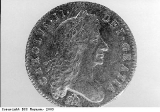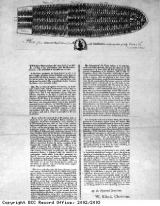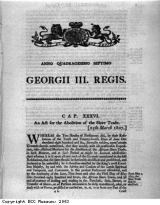British law and the slave trade
The trade with Africa, including the trade in slaves, meant much government legislation to control the trade. At first, this legislation was to limit the trade to certain companies and merchants (who had paid for the privilege). Later, it was to improve the conditions of the enslaved Africans in the ships crossing the Atlantic. At the end it was to abolish the trade altogether. Some of the British legislation is discussed below.
In 1618, royal permission was given to the ‘Guinea Companie’ to trade with West Africa. The main interest of the company was gold. The main supplies of gold were in the areas where the Asante people lived. It was then called Guinea, now it is part of Ghana, West Africa. In 1631, King Charles I sold the right to trade with Africa to a group of London merchants. In 1663, King Charles II sold the control of African trade to ‘The Company of Royal Adventurers of England Trading to Africa’. Then the Royal African Company was established in 1672, and was sold a monopoly of trade to Africa. This picture of a five guinea piece has King Charles II on it. The coin, first issued in 1663, was called after the coast of Guinea in West Africa, which was the source of much of the gold then traded to Britain. This coin was made using gold from Guinea traded by the Royal African Company. Below the king’s neck is the logo of the company, an elephant with a castle on its back.
There was a demand from merchants outside London to be allowed to share in this profitable trade. This demand led to a change in its organisation. In 1698 the Royal African Company lost its monopoly (or control) over the trade. This meant that any merchant could join in the trade to Africa.
The British had established a number of colonies in America and the Caribbean. Virginia in southern America was colonised in 1607. St Kitts in 1623, Barbados in 1625 and Jamaica in 1655, all islands in the Caribbean, were also colonised. In 1696, a government Board of Trade and Plantations was set up to administer the growing number of overseas colonies.
The Royal African Company (the London-based trading company) had lost its control over African trade in 1698. However, it was allowed to continue to maintain the trading forts which it had built on the West African coast. The company used the forts as a trading base where enslaved Africans could be held and slave ships could anchor. The other merchants now allowed to join the slave trade had to pay a fee to the Royal African Company towards the maintenance of these forts. In 1750, there were major changes to the way trade was organised in West Africa. The Royal African Company was replaced by the Company of Merchants trading to Africa. The Royal African Company had been run by London merchants. The new Company of Merchants Trading to Africa had a membership made up of 89 Liverpool merchants, 157 London merchants and 237 Bristol merchants. This meant that London merchants no longer had the most influence over the prosperous African trade.
From about the 1770s, there was a growing debate about the slave trade. In 1778 the House of Commons set up a committee to investigate the trade. Growing demand for the end of the trade in slaves led to the first law relating to this. It was called the Dolben Act, and it limited the number of slaves that could be carried on a slave ship. This was an attempt to improve the conditions on board ship for the enslaved Africans. The Liverpool slave ship, the Brookes, had carried over 600 slaves on one voyage. Under the new Dolben Act, the Brookes could carry about 300 slaves. A plan of the Brookes is pictured here. In 1807, the British Parliament voted for the Abolition (the ending) of the slave trade. The Act for the Abolition of the Slave Trade, is shown here. The act, or new law, started on 1 May 1807. The penalty if caught slaving after that was a fine of £100 per slave (£5,000 today) and the loss of the ship. The enslaved Africans would be freed. Some slave traders continued trading in slaves illegally after this date. Many, though, had already withdrawn from the trade because of the uncertainty over its future. They turned their attention to other trades.





